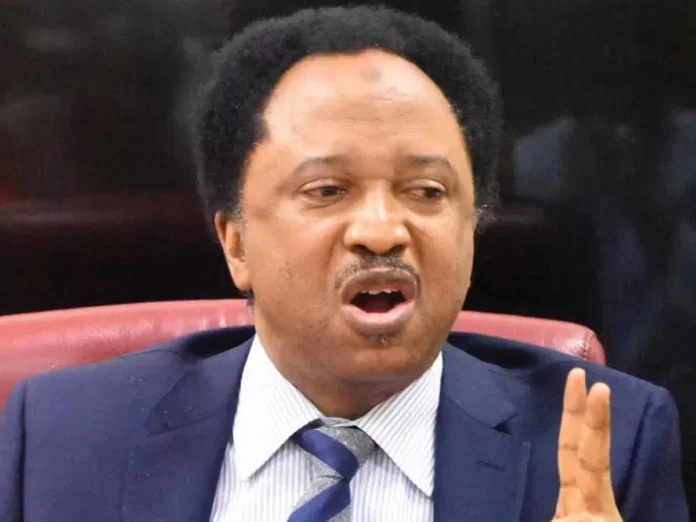Former Kaduna Central Senator, Shehu Sani, has strongly denied the allegation made by ex-Governor Nasir El-Rufai that the Kaduna State Government under Governor Uba Sani paid N1 billion to bandits. In a detailed, strongly-worded statement released on Sunday, Senator Sani described the allegation as “false, ridiculous, and politically motivated,” insisting that it lacks credibility and is driven by envy.
The controversy began when El-Rufai, during a public engagement, reportedly claimed that the current Kaduna administration paid the huge sum to bandits as part of negotiations to free kidnapped persons. His comments immediately generated widespread debate, especially in a state that has suffered years of insecurity, mass abductions, and attacks by criminal groups.
But Senator Sani, who represented Kaduna Central from 2015 to 2019, said the former governor has no moral authority to accuse anyone of wrongdoing on security matters. According to him, El-Rufai presided over some of the worst security breakdowns in Kaduna’s history and should not attempt to shift blame to others.
In the statement personally signed by him, Sani accused El-Rufai of “establishing a culture of appeasement to terrorists” during his eight years as governor. He recalled that El-Rufai himself once admitted to making “conditional cash transfers” to bandits in an effort to stop attacks. According to Sani, when journalist Luka Biniyat reported the admission, he was arrested and detained for several months.
Sani argued that it is hypocritical for the former governor to now accuse others of paying bandits, adding that if El-Rufai has evidence—photos, videos, documents—showing the alleged N1bn payment, he should make them public.
“Instead of trying to rewrite history, he should show Nigerians the videos or images of officials of Governor Uba Sani’s administration handing cash to bandits,” Sani stated.
Kaduna State has been one of the hardest-hit states in Nigeria’s worsening security crisis over the past decade. Communities across the state—especially in the central and southern regions—have suffered from mass kidnappings, village raids, and killings carried out by armed bandits.
Sani pointed out that several of the most shocking incidents took place under El-Rufai’s watch. These include:
The 2022 Kaduna–Abuja train attack, in which hundreds of passengers were kidnapped;
The Greenfield University abductions, where students were kidnapped and some killed;
The kidnapping of students from the Federal College of Forestry Mechanisation, Afaka;
The Bethel Baptist High School abductions;
Multiple attacks in Southern Kaduna which left entire communities displaced.
Sani said the level of insecurity during El-Rufai’s administration was so severe that some communities became “slaughter houses where criminals operated unchallenged.” He added that at one point the Kaduna airport was forced to shut down due to safety concerns.
In another example, Sani referenced El-Rufai’s decision to withdraw his son from a public school after threats from bandits. He said this action contradicts El-Rufai’s current attempt to portray his administration as being firmly in control of security.
According to Senator Sani, El-Rufai’s allegation is not only false but also rooted in envy. He argued that Governor Uba Sani has achieved significant progress in areas where El-Rufai struggled, especially in building unity between the predominantly Christian communities of Southern Kaduna and the mostly Muslim communities of Northern Kaduna.
Sani said El-Rufai’s era was characterized by “religious and ethnic discrimination, division, persecution, torment, and terror.” He accused the former governor of deepening communal mistrust, which worsened insecurity across the state.
“The success Governor Uba Sani is making in unifying the state is something El-Rufai cannot stand,” Sani claimed. “Instead of encouraging peace, he is sowing division through politically motivated lies.”
While acknowledging that Kaduna State continues to face serious security challenges—like many northern states—Sani praised Uba Sani for making what he described as “meaningful progress” in stabilising the state.
He said the current governor has taken steps to dismantle “the structures of banditry” that he claims were inherited from El-Rufai’s administration. These steps include closer collaboration with local communities, the military, and religious leaders.
Sani also stated that Uba Sani has worked to reduce tensions between different ethnic and religious groups, something he said is essential in addressing insecurity.
The public clash between Sani and El-Rufai adds to an ongoing political rivalry in Kaduna politics. Although both men were once seen as key political figures within the state, their relationship has deteriorated over the years.
El-Rufai’s allegation—if true—would severely damage the image of the current government. But Sani insists the claim is fabricated and meant to stir controversy at a time when the state government is trying to maintain stability.
In his statement, Sani challenged El-Rufai to publicly present any evidence supporting the allegation. He said that vague claims without proof only mislead the public and undermine the fight against banditry.
“Kaduna people have suffered too much to be dragged into false stories told by a man trying to stay politically relevant,” Sani said.
He added that anyone serious about tackling insecurity must tell the truth, improve community engagement, and strengthen cooperation between citizens and security agencies—not spread allegations that could cause panic.

